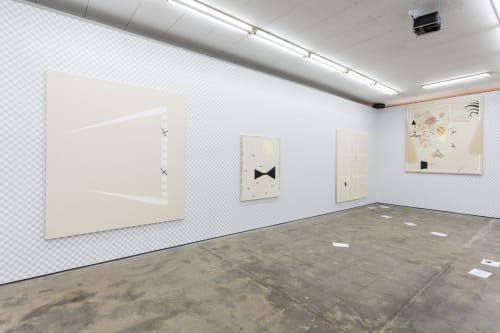Just below the ceiling of the exhibition space, printers spit out sheets of paper at irregular intervals. They fall down before walls with a white-and-gray grid, whose pattern is based on Photoshop’s transparency grid. Florian Meisenberg invited friends, artists, authors, and curators to send tweets and posts to these printers during the exhibition “Somewhere sideways, down, at an angle, but very close”. By nature immaterial and ephemeral, these messages become physically present in the exhibition space and “perform a short dance”, as Meisenberg says, before they land on the gallery’s floor, where they remain and pile up.
His paintings frequently depict digital motifs. In earlier works, for example, the white cursor of the mouse appeared on the canvas in an enlarged and above all pixelated form – though pixels are not something we associate with canvases. One the one hand, Meisenberg condenses the application medium into thick, coloured bulges that spread over the painting and into the joints of the stretcher. On the other hand, oily areas spread across the painting and sink deeply into the untreated canvas. Similarly to Helen Frankenthaler’s “stains”, Meisenberg makes do without any pigments: the binding agent becomes an artistic element, the oil fulfils the function of paint.
But perhaps more important is the fact that Meisenberg in this way also goes through the canvas. The permeability of all those objects called “screens” are of particular interest to the New York-based artist. On his recent canvases, the oily areas appear as imprints of hands, feet, and face, suggesting that the canvas has been physically touched and walked on. Short films on various screens don’t just underline the impression of an accessible overall installation, connected, as Meisenberg says, by “a virtual digital sphere and an analogue material reality”. It is especially videos like Wembley, farewell my Concubine (2013) that demonstrate the interfaces between a physical-painterly gesture and a virtual, simulated world. This short film of just a little more than two minutes shows a shop window looking out on the street. From the left, the artist’s hand reaches into the pictorial space, and a cat behind the window feels petted and caressed. The cat purrs even though Meisenberg cannot physically reach her – the glass separates the two bodies. The hand can apparently be effective through the screen, the glass of the shop window, and thus the work also addresses a medium of physical or gestural design that is by definition based on tactility and suggested permeability: the touch screen.
Meisenberg’s second solo show at WENTRUP creates with its growing piles of paper with tweets and posts, between “desktop” walls, analogue paintings with digital motifs, and short films a world that connects newer notions of “glitch”, “delay”, “error”, or “lag” with the older medium of painting. In 1973, Vito Acconci in his work “Theme Song” lay down on the floor in front of his video camera and beckoned the beholders to join him behind the screen on the other side, as if Acconci’s black-and-white reality behind the screen were accessible for us. Florian Meisenberg’s expansive exhibition “Somewhere sideways, down, at an angle, but very close” now offers a similarly fascinating reaction to the much more complex interrelations of the analogue and digital realities of today.
Florian Meisenberg was born 1980 in Berlin. After gradduating his studies at Peter Doig’s masterclass at the Kunstakademie Düsseldorf he moved to New York. He already has won important awards such as Kunstpreis Junger Westen, Arbeitsstipendium of Stiftung Kunstfond Bonn, DAAD scholarship for New York and the Audi Art Award. Florian Meisenberg had several international gallery and institutional shows, as for example at Ludwig Forum, Aachen, Germany, Wilhelm-Hack-Museum, Ludwigshafen, Germany, Museum Kunsten in Aalborg (DK), Kunstwerke Berlin, Germany and Queens Museum of Art, US. In September 2014 Florian Meisenberg will have a solo exhibition at Kasseler Kunstverein, Germany.

